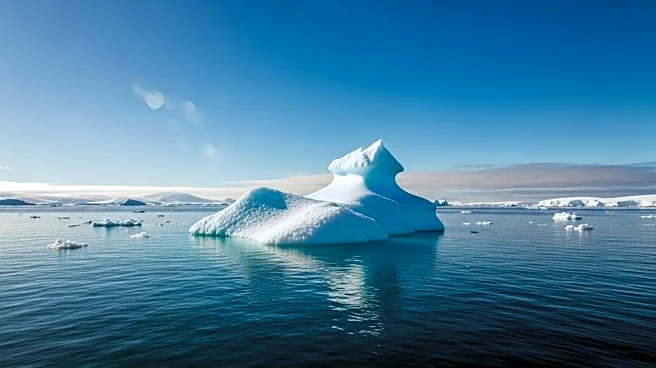What is the story about?
What's Happening?
Antarctica may have crossed a critical climate tipping point, with a significant decline in sea ice formation observed since 2016. Scientists attribute this sudden change to human-induced ocean warming, which has accelerated the loss of sea ice. The extent of Antarctic sea ice reached record lows in 2023, marking the third consecutive summer of minimal ice coverage. Researchers are concerned that this shift represents a permanent change with potentially catastrophic consequences for global sea levels. The warming of deep ocean waters, driven by climate change, is believed to be a key factor in the rapid decline of sea ice.
Why It's Important?
The loss of Antarctic sea ice has profound implications for global climate systems. Sea ice plays a crucial role in stabilizing glaciers and ice sheets, and its decline could lead to accelerated melting and significant sea level rise. The Antarctic ice sheet contains enough water to raise global sea levels by 58 meters, posing a threat to coastal communities worldwide. Additionally, the reduction in sea ice affects the Earth's albedo, leading to further warming as dark ocean waters absorb more heat. The potential release of stored carbon from deep ocean waters could exacerbate climate change, highlighting the urgent need for international climate action.
What's Next?
Scientists are continuing to study the changes in Antarctic sea ice to better understand the long-term impacts and potential feedback mechanisms. Efforts to mitigate climate change through reducing greenhouse gas emissions are critical to slowing the rate of ice loss. International collaboration and policy changes may be necessary to address the broader implications of this tipping point and to protect vulnerable coastal regions from rising sea levels.
Beyond the Headlines
The decline in Antarctic sea ice underscores the interconnectedness of global climate systems and the far-reaching effects of human activity. Ethical considerations arise as the potential for irreversible environmental damage becomes more apparent. The need for sustainable practices and global cooperation in addressing climate change is more urgent than ever, as the consequences of inaction could be devastating for future generations.

















